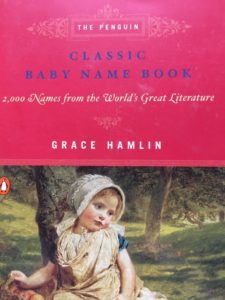What’s in a name? Or perhaps that question should be, ‘who’s in a name’?
I’ve realised that I have a two-tier approach to naming the characters in my novels. For the leads, I go to extreme lengths not to use names of people I know personally, but for all the background characters, I am more relaxed and confess a few of my friends have popped up—in name only, I stress—over recent years!
However, I certainly couldn’t use a first name for one of my leads—someone I spent a lot of time with, got to know and had probably fallen in love with—and then in a later book give the same first name to an unpleasant character.
This is not something I share with Jane Austen, who seems to have had a much more prosaic approach, often using a first name for a heroine in one novel and then giving it to an unpleasant character in another. These names were also prolific amongst her close family, including frequent use of names shared by her brothers and their wives and children!
One of the best examples is Elizabeth Bennet in Pride & Prejudice. She’s a strong, confident young woman, a character Jane Austen had clearly become attached to, as shown in a letter written to her sister, Cassandra, the day after the book’s publication:
“I must confess that I think her as delightful a creature as ever appeared in print, & how I shall be able to tolerate those who do not like her at least, I do not know.” 29th January 1813
 Yet in her last completed novel, Persuasion, the author gives the name Elizabeth to Miss Elliot, who is cold, haughty and self-centred.
Yet in her last completed novel, Persuasion, the author gives the name Elizabeth to Miss Elliot, who is cold, haughty and self-centred.
More amusing is Austen’s aversion to the name Richard. In the opening paragraph of Northanger Abbey, she refers to the heroine’s father as ‘a very respectable man, though his name was Richard’.
She does use the name across several of her novels, but only for non-speaking characters, with the most scathing reference in Persuasion.
“…that the Musgroves had had the ill fortune of a very troublesome, hopeless son; and the good fortune to lose him before he reached his twentieth year… He had, in fact… been nothing better than a thick-headed, unfeeling, unprofitable Dick Musgrove, who had never done anything to entitle himself to more than the abbreviation of his name, living or dead.”
Of course, there’s always the option of simply not giving a lead character a first name, something Daphne du Maurier did in one of my all time favourite novels, Rebecca. The book’s title is the name of the first Mrs de Winter, and the story is narrated by the second. This Mrs de Winter’s name is never revealed.
The author was often asked why this was so, and in a book she later wrote about her novels and writing career, Daphne du Maurier gave this explanation:
“…why did I never give the heroine a Christian name? The answer to the last question is simple: I could not think of one, and it became a challenge in technique, the easier because I was writing in the first person.”
Charles Dickens is, of course, notable for thinking up names to suit a characters’ nature or profession: Sloppy, Wopsle, Sweedlepipe, Pumblechook, Skimpole, Bumble and Toodle, to name but a few.
I think we can be pretty certain these weren’t people he knew in person, but—fabulous as they are—I don’t think it’s a talent I have. Perhaps it’s time to browse the Penguin Classic Baby Name Book for some inspiration…
Sources: Jane Austen and Names by Maggie Lane and The Rebecca Notebook and Other Stories by Daphne du Maurier and Jane Austen’s Letters, edited by Deirdre le Faye.


And then, of course, all the other opinions from early readers like me who offered comments to really throw you into a conundrum…ha!
Still, fascinating article!